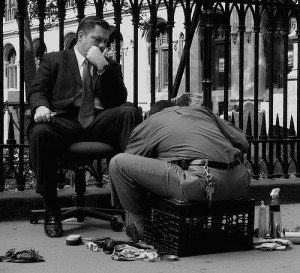 Why are so many Americans opposed to universal health care? There’s a unique attitude towards inequality in the US compared to other highly developed countries. It shows up in international surveys that ask questions on inequality, hard work, and luck.
Why are so many Americans opposed to universal health care? There’s a unique attitude towards inequality in the US compared to other highly developed countries. It shows up in international surveys that ask questions on inequality, hard work, and luck.
When asked by the International Social Survey Programme whether they agree or disagree with the statement “Income differences in your country are too large,” 62% of Americans agree. In other countries — a total of 43 countries were surveyed, some with much greater equality than the US — the median response was 85%.
In another survey – the World Values Survey of 40 countries – respondents were asked if they agree with the statement “The poor could escape poverty if they worked hard enough.” In America, 71% agree, compared to 40% in Europe. When asked if they agree with the statement “Luck determines income,” only 30% of Americans agree, versus 71% of Europeans.
Attributing success to the qualities of individuals is a form of blindness
In their recent book on income inequality in the US (see Income inequality and American politics), political scientists Paul Pierson and Jacob Hacker offer an explanation for why Americans fail to perceive the extensive organization that surrounds individual politicians. The apparatus that makes politicians and celebrities a success is designed to be invisible. This creates the illusion that it’s only the hard work of the lone individual that gets rewarded. (Words in bold are italicized in the original)
More than most societies, Americans believe that people rise or fall as a result of their own efforts, and therefore get what they deserve. Critically, when we say this is a nation of individualists, we don’t just mean Americans embrace individualism as a social ethic. Underpinning this ethic is tendency to interpret the world in highly individualistic terms. We distribute blame and praise to individuals because we believe that it is their individual actions, for better or worse, that matter. People get what they deserve.
Our media-driven culture of celebrity reinforces this individualistic outlook. Television, of course, is tailor-made for visual images of larger-than-life individuals. Building up (and tearing down) those who capture the media’s fancy lends itself to the simple storytelling and morality tales that audiences crave. Never mind that … massive organizational realities lurk behind the individualistic façade. New York and Hollywood are home to huge factories or organized activity that cultivate, produce, and then bloviate about the “individuals” who command our attention. The factories stay in the background, while breathless discussions of Branelina’s twins get the airtime.
This preoocupation with specific personalities and insistence on attributing everything that happens to the qualities of individuals is a form of blindness. We see individuals, but not the organizations that help to pool their resources and can vastly extend their range of social action.
Hacker and Pierson go on to discuss the vast organization behind politicians, but this same logic explains why many Americans believe the poor haven’t worked hard enough to deserve health care.
Related posts:
Income inequality and American politics
Why the US doesn’t have universal health care
Health care inequality: The US vs. Europe
A reason for health care reform
Where the poor live: The more polluted part of town
Life expectancy of the rich and the poor
Health inequities: An inhumane history
Resources:
Image: flickr
Elizabeth Gudrais, Unequal America: Causes and consequences of the wide—and growing—gap between rich and poor, Harvard Magazine, July-August 2008
Paul Pierson and Jacob S. Hacker, Winner-Take-All Politics: How Washington Made the Rich Richer–and Turned Its Back on the Middle Class


Sorry, comments are closed for this post.